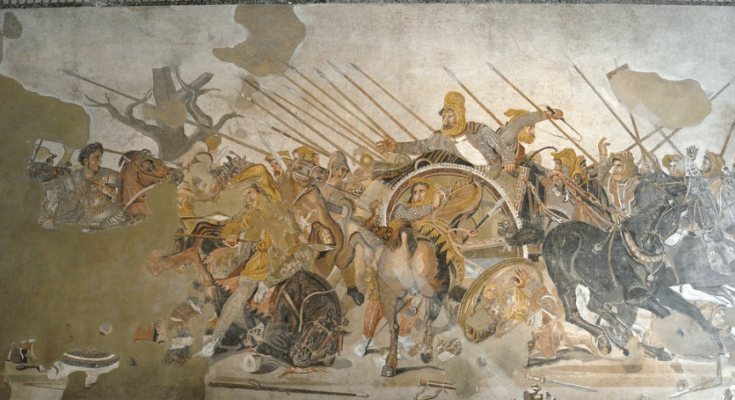Alexander the Great, one of history’s most legendary conquerors, did not rely solely on military might and strategic brilliance to expand his empire. Integral to his success was his masterful use of myths, which served both diplomatic and personal purposes. By aligning himself with well-known heroes and divine entities, Alexander harnessed the power of myth to navigate unfamiliar territories, foster alliances, and inspire himself.
Diplomatic use of myths
The Argead dynasty of Macedon employed myths from the onset of their Greek campaign to reinforce their rule. Their descent from Hercules, a hero revered across the Greek world, was a significant diplomatic asset. One example comes from Isocrates, an Athenian orator at the time of Alexander’s father, Philip.
The Athenian wrote a speech on how Phillip should reconcile Athens, Argos, Sparta, and Thebes to focus their attention on a common eastern foe as Hercules had done prior to him. Macedonia’s Herculean connection bolstered legitimacy among the Greek states. It allowed Phillip and Alexander to present themselves as unifiers of Greece, much like Hercules.
Another notable instance of this diplomatic use of myth occurred in Thessaly. This time, it was from Alexander himself. Here, young Alexander convinced the locals to surrender by invoking the city’s shared origins, settled by Hercules. This appeal to common heritage was successful, and he was received without military intervention.
Similarly, in Mallos, in southern Anatolia, the locals welcomed him as a distant relative of their founders who descended from Hercules. By claiming Herculean heritage, Alexander presented himself as a relative and ally of these cities. However, the role of myths didn’t end with diplomacy during his campaign.
Personal and esoteric importance of myths
Myths held deep personal significance for Alexander. They provided him comfort and a sense of connection to the past. Biographer Plutarch viewed Alexander’s journey through Asia as a quest to emulate and surpass mythical heroes. His actions mirrored these figures, like hurling his spear on the Trojan shores and sacrificing to Priam’s tomb to reconcile past animosities with Troy.
Alexander’s devotion to the Iliad is another example. He reportedly slept with a copy of the epic under his pillow. He sought to model his life after Achilles, even mourning his friend Hephaistion much like Achilles grieved for Patrocles. This identification with mythical figures provided Alexander with psychological comfort and inspiration.
Myth and reality: The siege of Tyre
One striking example of myth and reality intertwining in Alexander’s life is the siege of Tyre in modern-day Lebanon. Tyre’s patron god was Melqart, the Phoenician Hercules. This divine association with Alexander’s ancestor and idol caused the Macedonian to hesitate in attacking the city.
However, that night, Alexander dreamed that he attacked the city while Hercules stood at the city’s wall, beckoning him with his right arm to go forth. This vision bolstered his resolve and motivated his troops.
Tyre, originally an island, put up resistance, guarded by an ocean wall. Alexander famously built a bridge to the island to lay siege to it. After the city’s fall, Alexander honored Hercules with sacrifices and public ceremonies. This blend of mythic reverence and political propaganda solidified and helped Alexander conquer the city.
Myths boost morale and motivation
Similar to Tyre, myths played a crucial role in maintaining the morale of Alexander’s troops. When his men were reluctant to march further into India, Alexander reminded them of their accomplishments. They had surpassed the wanderings of Dionysus and Hercules. He cited their capture of the rock of Aornos, where Hercules freed Prometheus, and their success in Nysa, linked to Dionysus. These references uplifted his war-weary soldiers, giving their campaign historical and divine significance during their campaign.
This psychological strategy resonated emotionally with his troops. Alexander made foreign territories feel familiar by associating their conquests with well-known myths. Amitay’s 2010 study suggests this helped his men forge a deeper connection with the lands they conquered. Nonetheless, myths didn’t play a collective role. They were also of personal significance to Alexander the Great.
Mythic aspirations and self-identification
Alexander’s visit to the oracle of Siwah in Egypt marks a pivotal moment in his self-identification with the divine. He sought to confirm rumors about his divine parentage. Braving the remote desert, he consulted the oracle of Amon. Bosworth’s 1977 analysis notes that the Egyptians had already accepted him as a pharaoh and incarnation of Zeus-Ammon.
Alexander the Great didn’t need to go to the oracle of Siwah to legitimize his throne. Rather, the Macedonian had a personal reason to make that pilgrimage. Alexander’s visit hoped to put to rest a rumor that Philip II wasn’t his real father, which had been suspected from an early age.
Following in the footsteps of Hercules and Perseus, Alexander made the perilous journey to the oracle, even at the risk of jeopardizing his entire campaign. At the sacred site, he would receive the answer he intuited. He was the son of Zeus-Ammon.
This newfound divine status fueled Alexander’s ambition. According to multiple ancient sources, Alexander repeatedly mentioned how he had surpassed Hercules and Dionsus’ achievements. Consequently, myths imbued Alexander’s conquests with a transcendent purpose.
How Alexander used myths to conquer the world
Alexander the Great’s use of myths was a multifaceted tool that went beyond storytelling. He conquered the known world by invoking the legacy of revered gods and heroes. This legacy legitimized his conquests and inspired his troops and quest for greatness. Through myths, Alexander transformed his campaigns into his own grand saga, a legacy that continues to captivate today’s world.



